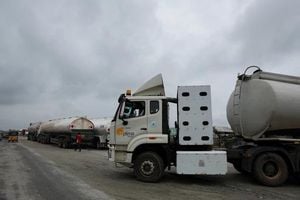A significant step toward independence has been taken by Nuevo León, as the state has approved a public consultation aimed at gauging citizen support for becoming independent from Mexico. This unprecedented move, formalized by the State Electoral Council on December 16, 2024, marks the beginning of what could be a momentous shift in the region’s political status.
The question to be asked of the citizens will be straightforward: "Would you agree for the state of Nuevo León to be an independent country?" The plebiscite is slated for August 6, 2026, but before this can happen, organizers will need to gather electronic signatures, at least 2% of the registered voters, through the app provided by the National Electoral Institute (INE).
This initiative, led by Gilberto Lozano, a well-known businessman and activist, has stoked significant debate. Lozano argues this move stems from dissatisfaction with the current relationship between the federal government and states, which he claims has undermined local rights and autonomy. He advocates for independence, stating it would enable Nuevo León to align more closely with its unique economic interests.
Traditionally, the notion of Nuevo León as its own nation has often been treated lightly—often the subject of memes and casual discussions—until now. The formalities surrounding the consultation suggest this idea could soon transition from fiction to serious political discourse. Lozano's advocacy dates back to his formal request presented on November 20, 2024, which highlights dissatisfaction with the central government's handling of regional issues.
Lozano’s critics, including some local residents, warn against such drastic measures. They argue the independence movement poses more challenges than solutions. An analysis of the potential challenges reveals numerous legal, political, and economic hurdles. For one, the Mexican Constitution describes the nation as indivisible, making any formal separation inherently unconstitutional and fraught with legal battles.
Should the plebiscite yield favorable results, the practicalities of independence loom large. Nuevo León would face the formidable task of establishing its systems: crafting new laws, achieving international recognition, and developing its fiscal policies. Such changes might include forming economic treaties and laying the groundwork for its currency.
The division among residents of Nuevo León is palpable. Supporters of independence articulate aspirations for increased local control over governance, allowing for decisions more reflective of regional needs. Conversely, skeptics point to potential drawbacks, such as higher operational costs and risks related to international isolation.
Beyond the immediate concerns of Nuevo León's populace, there are broader national ramifications. Should the state successfully secede, Mexico would lose one of its most economically vibrant regions. Nuevo León is responsible for nearly 8% of the national GDP, serving as a cornerstone for sectors like manufacturing, technology, and international trade, which could destabilize the broader economy.
Discussions surrounding the independence referendum are already permeated with mixed emotions. While some celebrate the prospect of greater autonomy, others fear the discontent and division it fosters could unravel the unity of the nation.
Despite the challenges and uncertainties it faces, the independence movement is undeniably catalyzing conversations about the governance structure within Mexico. With the plebiscite set for 2026, interest will surely intensify over the next years. The question now remains: Will the dream of independence turn from aspiration to reality for Nuevo León?



